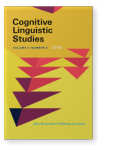Vol. 5:2 (2018) ► pp.410–425
The time of human thoughts and deeds
A cognitive discourse analysis of Hamlet and Macbeth
A mysterious part of our physical and psychological models of the world is Time. Its cognitive representation has evolved from Mythology through Literature to Physics. In ancient times, it was Kala of the Indo-Europeans, Chronos of the Greek gods, and the Kirke of Odyssey whose world could make heroes forget about anything. Then came Renaissance, the gradual awakening of the Time of Soul, the swing of philosophical mind between material and ideal worlds, its acceleration to the Relativity of Einstein, and the recent collapse on the Quantum Theory and to new biocentric passages. Shakespeare’s world of human mind and characters is so diverse and opulent, that anyone can find and emulate natural and supernatural phenomena in it, getting food for philosophical, psychological contemplation and even ideas for quantum-physical speculations. The truth is that Time molds the world of matter with the subjective world of human dreams and deeds.
Article outline
- 1.Overture
- 2.Recitative
- 3.Ambiguities of Shakespearean concept of time
- 4.Heidegger’s resolution
- 5.The readiness is all!
- 6.Epilogue
- Notes
-
References
